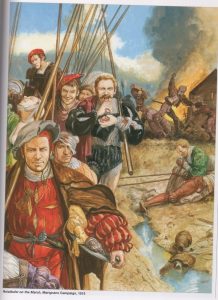This is a guest post by Allan Bishop, a mid-twenty-something writing hack, and yuppie professional somewhere in the Greater Boston area. He laments the passing of bacon, enjoys long walks on back roads, and provides irreverent but affectionate takes, guides, and discussions on science-fiction, fantasy, and the mechanics of writing. His life, unfortunately, has been hijacked by Al-Bawk the Undying, a sentient storytelling chicken.
You can contact him on:
- Twitter:https://twitter.com/GLionwhyte
- Goodreads:https://www.goodreads.com/user/show/16510736-arby
- Personal Website: This Life Is Hijacked
- Review Website: Seagull Bomb Reviews
Bawk, Bawk!
Black Dogs: A Guide On Select Mercenaries (Real and Fictional) Throughout History
The Black Company, The Golden Company, Outer Heaven. Mercenaries have fascinated readers in fantasy and science-fiction for as long as both genres have existed. More organized and ruthless than your lovable rogue, the mercenary serves often as an antagonist or a protagonist, depending on what purpose they serve in a story. While mercenaries are often considered villainous or elite fodder for traditional high fantasy heroes, mercenaries have played integral roles in politics, social mobility, and providing economic stability for underdeveloped nations throughout history. When crafting mercenaries—whether a band of deserters turned to protecting a local noble’s property to elite soldiers serving as bodyguards for the Goddess-Empress of Sol— it is important to consider their origin, their relation to the setting, and how they generally maintain themselves. The following examples provide a quick overview on various mercenary groups, their roles in history, and how they can serve as inspiration for your own stories, settings, and themes.
Antiquity: The Celts
During the heyday of the Greek city-states, the Hellenistic Mediterranean, and the Roman Republic, there were many ethnic mercenaries. Few struck awe, terror, and respect in the ancient world as the Celts. The Celts are said to have predominantly lived in ancient Gaul and stretched as far as Ireland during their early migrations in the Iron Age. In part, what made the Celts relatively efficient was their pioneering of chainmail (which was adopted by the great powers of the Mediterranean like Rome, Greece, Egypt, etc). In addition, the Celts were considered expert spearmen and accomplished charioteers. The Celts fought for countless ancient kings, queens, and lords. While feared and often hired because of the terror they struck in the Mediterranean, they were notoriously fickle. Often signing on for one city-state, only to turn on their employer for better wages or promises of plunder, the Celts were considered a necessary evil. One of the more interesting aspects of their existence was the development of a nomadic mercenary culture wherever they traveled. Celtic mercenaries often demanded payment not only for their men but also women and children. Entire tribal units, subclans, and other familial models developed out of the Celts’ nomadic raiding and campaigns for Mediterranean cities and powerful regional forces. They even served as Cleopatra’s elite guard during her reign.
For antiquity-inspired settings, the Celts are a great source of inspiration. Sometimes stable, often times masters who only served their own interests, their political and social influence in an analogous setting cannot be underestimated. Creating a culture of nomadic tribes fighting for their own causes and developing unique social models, can lead writers to discover their own execution of this type of mercenary in their own setting. Whether a band of dying tribals trying to reclaim their ancestral homeland or widowed women taking up arms to fend for their children, there are a number of different ways to explore an antiquity rooted mercenary culture and model based on or inspired by the Celts.
Renaissance: Reislaufer
During the Renaissance, mercenary companies reigned supreme. Coming out of the Hundred Years War, legendary mercenary captains like John Hawkwood, ruled the military campaigns and defenses of the Italian Peninsula. Due to the lack of standing armies, developing nations, especially the divided city-states of Italy, had to rely on the expertise and sometimes fickle ambitions of mercenary captains and their specialized companies. The companies often acted as special troops, early shock troopers, and military advisors to local Italian clans that ruled either through money (like the Medicis) or through ancestral claim. While mercenaries of various skill levels, ethnicities, and goals proliferated, there is one exemplar that dominated and was later dismantled by its imitators in the early 16th century: the Swiss Reislaufer.
I cannot stress enough the importance of the Swiss mercenaries in terms of the development of standing armies, modern military tactics, and the cultural and economic impact they had on the Swiss Confederation from the 14th to 16th centuries. After Switzerland defeated their Hapsburg superiors, the Swiss cantons (local provinces within the Swiss Confederation) quickly developed Reislaufer companies. What made the Reislaufers so deadly was their usage of pikes and halberds, their often strict adherence to their employer’s contracts (obviously not all companies were so professional), and their general policy to not take prisoners. For the better part of the 15th century, Swiss Reislaufers dominated the European battlefields. Not only did they set the standard model for mercenaries in Europe, they were vitally important to the economic prosperity of the Swiss cantons. Cantons were often rural provinces where economic opportunities for lower class farmers and peasants were limited. Young Swiss men joined Reiuslafer companies for pride, for economic mobility, and often times for the thrill of combat and adventuring. With the advent of rival imitators (like the infamous German Landsknechts), the rise of improved firearms, and changing Swiss Confederation policies, the Reislaufers declined and by the early 18th century, fledgling nation-states raised modern standing armies, while mercenaries lost their importance and influence.
What’s important to take away from the Reislaufers is once again their overall impact and importance in history. The Swiss Guard continues to exist in the modern era. The Reislaufers provided a social, economic, and cultural model for young men of the Swiss Confederation. Their intersection of politics and economics makes them an interesting model for more Renaissance-inspired settings. Developing a nation of professional soldiers who fight for their families and their country by fighting other nations’ wars could make for a unique plot or faction within your setting. How they develop their fighting techniques, their influence on regional politics and intrigue, their own thoughts on the developing world, the possibilities of using the Reislaufers as a springboard for stories, characters, and worldbuilding cannot be discounted. Whether elite killers of a powerful Holy Roman Empire analogue, or a nation of borderless soldiers discarded by petty kings and tyrants rebelling against the old order, the possibilities are endless. Speaking of soldiers without borders…
Modernity: Outer Heaven
I will profess I saved the best (in my opinion) for last. While private military companies (PMCs) gained notoriety in the Iraq and Afghanistan Wars for their cavalier attitudes, scandals, and general antics during the Bush administration, private military companies existed long before that time period. The French Foreign Legion is perhaps one of the more famous real-world examples, having fought in countless African wars and conflicts from the 1960s up until the late 1990s/early 2000s. However, in fiction, we often draw from real-world organizations and then use them as an analogue for our own settings.
Within Soldiers Without Borders, a nation where soldiers will never be discarded, Outer Heaven is one of the most unique and complex executions of the mercenary archetype and, by extension, mercenary culture. Founded by Big Boss (the greatest soldier of the 20th century in Metal Gear’s alternate history setting), Outer Heaven exists as a private military company, a nation where soldiers of all ethnicities are free to fight an eternal war. It combines an anarchist philosophy with a rumination on the nature of soldiers, their place in the modern era, and where those who feel the thirst for conflict could live and die according to their own wills.
In short, Outer Heaven is a fictionalized and romanticized execution of modern mercenaries. A messianic mercenary commander who saved child soldiers, only to put them back on the battlefield, does not exist. A group of three hundred to over a thousand men and women from all ethnicities carrying out black operations in various amoral conflicts bound by their love and loyalty to said mercenary commander is not entirely realistic. The point, however, is how much influence Outer Heaven has (as a group, a nation, and an entire philosophy) on Metal Gear’s setting, plot, and characters. At the heart of Metal Gear’s conflict is the nature of war and what soldiers of all sides truly fight for. Every single soldier, mercenary, spy, and infiltrator in Metal Gear often has complex or sympathetic motives and backstories that reinforce the series’ themes of pacifism, leaving conflict behind, and the futility of violence. While stylized, Outer Heaven represents a culmination and interpretation of mercenaries, their cultures, and their place in history that few stories have come close to mimicking or matching. There is a reason why Metal Gear is extremely popular for its bombastic and morality play-like stories.
Mercenaries exist in countless forms and executions in both science-fiction and fantasy. Some are nothing more than faceless goons to be cut down by your heroes, and that’s ok. Some are complicated and sympathetic villains or protagonists, often fighting for a variety of reasons. While there is no one way to create mercenaries, their cultures, or roles in your story, understanding the mentality of soldiers, the often ambiguous nature of mercenaries throughout history, and looking to history and past interpretations in SFF, can lead you to discover your own take on a classic staple of both genres. Mercenaries are cool but more often than not, they are a powerful element of history, war, and culture, to be explored and have their stories told in ways that few other genres can or come close to presenting. How you do it? Well, that’s up to you.









oh wow, i had only heard of black dogs having been ghosts , is this also the origin of why the Germans called US Marines , devil dogs?
Erm… don’t know! 😀
Thank you for sharing the article on mercenaries. As I’m very interested in Celtic culture and history, I particularly like the section on them. The Greeks and Romans wrote about the ferocity of their women as warriors, which makes sense within the context of their nomadic mercenary culture. Give Perro a high five!
Yay! Thank you, Linnea 🙂
The irony is a lot of mercenaries are seen as either bloodthirsty brigands or glorified warriors above all others. Like most militaries, mercenaries have been pretty all the over place. They dominated the Renaissance given the lack of standing armies, but ironically were phased out right around the time of Napleon’s rise. With the emergence of nation-states in the early 1800s, and early modern border, mercenaries of yesteryear became obsolete after training the first standing army of the modern era.
Yet they still endure, which is why they’re fascinating to study/use as a reference in fiction.
Mercenaries are historically interesting indeed. I recall reading about the Greek Hoplite mercenaries, employed to defend the citadel in Carthage. A reliable group of professional soldiers was worth a lot to generals who mainly relied on conscripted citizens to form their armies.
Best wishes, Pete.
An excellent point. Plus, the whole Expedition of Cyrus (as told by Xenophon) referred to such a group of mercenaries.